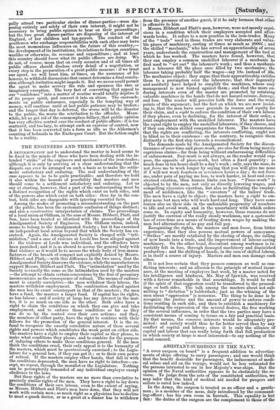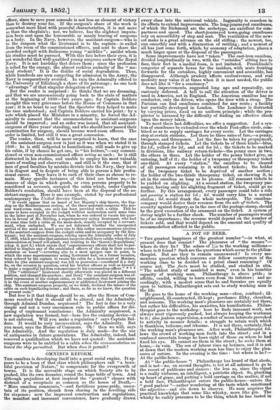ASSISTANT-SUItGEONS IN THE NAVY.
" A GOOD surgeon on board" is a frequent addition to advertise- ments of ships offering to carry passengers ; and one would think that the benefit desirable for passengers, the inducement of medi- cal solace and aid on the voyage, would not be less estimated for the persons intrusted to sea in her Majesty's war-ships. But the opinion of the Naval authorities appears to be obstinately the re- verse. To judge from the acts of the constituted authorities, we may infer that the End of medical aid needed for paupers and sailors is rated low indeed.
In the Army, the surgeon is treated as an officer and a gentle- man ; is a member of the mess, duly introduced by the command- ing-officer ; has his own room in barrack. This equality is but fair: the duties of the surgeon are the complement to those of the
officer, since to save your comrade is not less an element of victory than to destroy your foe. If the surgeon's share of the work is somewhat more blest with peaceful characteristics, it is not more so than the chaplain's ; nor, we believe, has the slightest imputa- tion been cast upon the honourable or manly bearing of surgeons as a body. In the Navy, however, the assistant-surgeon—who is to the surgeon what the lieutenant is to the captain—is exiled from the room of the commissioned officers, and sent to share the crowded cockpit with frolicsome young " middies "; amidst whom his studies must be pursued. With this fate before their eyes, it is not wonderful that well-qualifiedyoung surgeons eschew the Royal Navy. It is not hardship that deters them; since the profession is noted for the energy, the almost reckless audacity of the " me- dical student." It ip the dislike of social degradation. Thus, while hundreds are seen competing for admission to the Army, the Navy is comparatively avoided. In vain the Admiralty offered to the University of Edinburgh a share of its patronage; no one took " advantage " of that singular delegation of power. But the reader is surprised : he thinks that we are dreaming, and that we are unconsciously going back to the state of matters at the beginning of 1850—two years ago; for Captain Boldero brought this very grievance before the House of Commons in that year; it is no boast to say that the Spectator then helped to make the case understood ; and Captain Boldero carried his point : by a vote which placed the Ministers in a minority, he forced the Ad- miralty to consent that the accommodation to assistant-surgeons should be improved; and an order was issued, that all assistant- surgeons of three years' standing, and who should have passed their examination for surgeon, should become ward-room officers. The order is limited, but still it was a great concession.
The reader, then, will be more surprised to learn, that the case of the assistant-surgeon now isjust as it was when we stated it in 1850: he is still subjected to humiliations, still made to give up his cabin, if by chance he get one, to "his betters,"—any commis- sioned or even non-commissioned officer acting as such ; he is still distracted in his studies, and unable to employ his most valuable years of reading and observation ; and still is it the case, that if men of good faculties by mistake deviate into the Navy, they leave it in disgust and in despair of being able to pursue a fair profes- sional career. They leave it to such of their class as choose to re- main. Many specific instances of this kind are before stances of ships in which goods, or even persons properly to be considered as servants, occupied the cabin which, under Captain Boldero's resolution, should have been at the disposal of the as- sistant-surgeon. Here is one example, stated by our professional contemporary the United Service Gazette.
" It would appear that on board of her Majesty's ship Queen, the flag- ship on the Mediterranean station, of the three assistant-surgeons who pos- sess ward-room rank, one only has been provided with a cabin. This he seems to have occupied in the cockpit without molestation until some time in the latter part of November last, when he was ordered to vacate his quar- ters in favour of Mr. Stirling, a supernumerary acting lieutenant, who had for some time held a cabin on the main-deck, usually occupied by a servant- maid, when embarked. We are not informed whether the unexpected arrival of the maid on board gave rise to this rather unceremonious ejection of the assistant-surgeon from the cockpit cabin and its occupancy by the lieu- tenant; but the assistant-surgeon, relying upon the Admiralty- order of July 17,1850, which provides that assistant-surgeons shall have cabins when the ac- commodation on board willadmit, and trusting to the Queen's Regulations,' (chap. ii. part 6,) which enjoin that supernumerary officers shall not be per- mitted to displace any of the established officers of the ship in their accom- modation on board'—reverting also to a most apropos case in point, in which the same supernumerary acting lieutenant had, on a former occasion, been ordered by the captain to vacate his cabin for a lieutenant of Marines, while he (the assistant-surgeon) was left in possession—considered it a duty he, on the occasion in question, owed his brother officers as well as himself, to make a respectful but firm remonstrance to his commanding-officer." * • •
[The "additional" lieutenant shortly afterwards was placed in a different position, and changed his quarters; and then] "the assistant-surgeon was of- fered repossession of the cockpit cabin, on the condition that he would resign it in the event of another supernumerary or additional lieutenant joining the ship. The assistant-surgeon properly, as we think, declined the tenure of the cabin on such humiliating terms ; and there, so far as we know, the question at present rests."
But how is it that things should be so, after the House of Com- mons resolved that it should all be altered, and the Admiralty, through Admiral Dundas, acquiesced ? The fact is due to a very simple and not a very uncommon rule in public offices for dis- posing of unpleasant conclusions : the Admiralty acquiesced, a new regulation was framed, but—here lies the cunning device—it is not enforced. Will you make a regulation P says Captain Bol- dero. It would be very inconvenient, says the Admiralty. But you must, says the House of Commons. Oh ! then we will, says the Admiralty. And the regulation is duly made—for the use of antiquaries in future generations. The Admiralty, indeed, had reserved a qualification which we have not quoted : the assistant- surgeons were to be entitled to a cabin when the accommodation on board the ship permitted. But when does it permit?



































 Previous page
Previous page